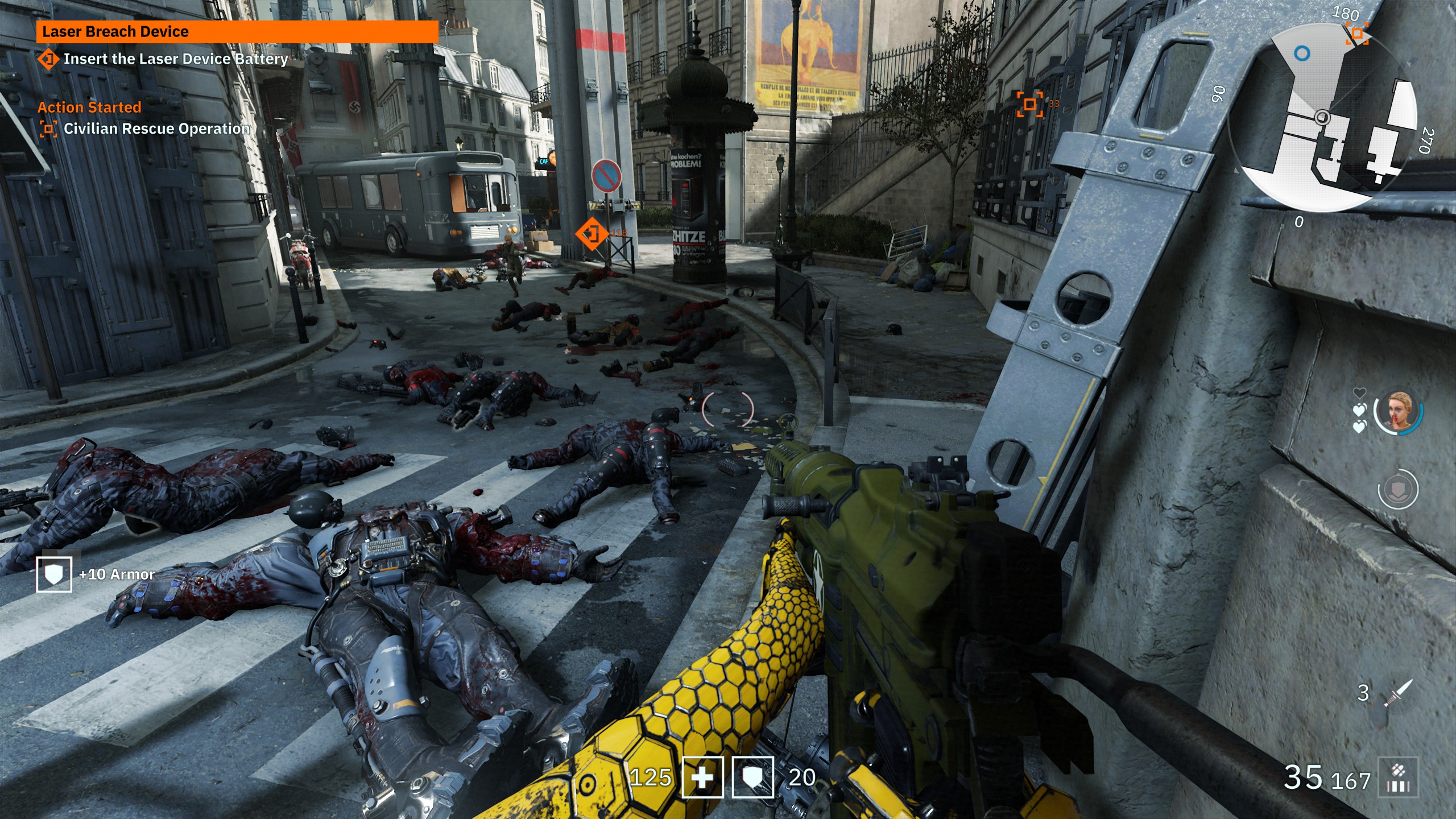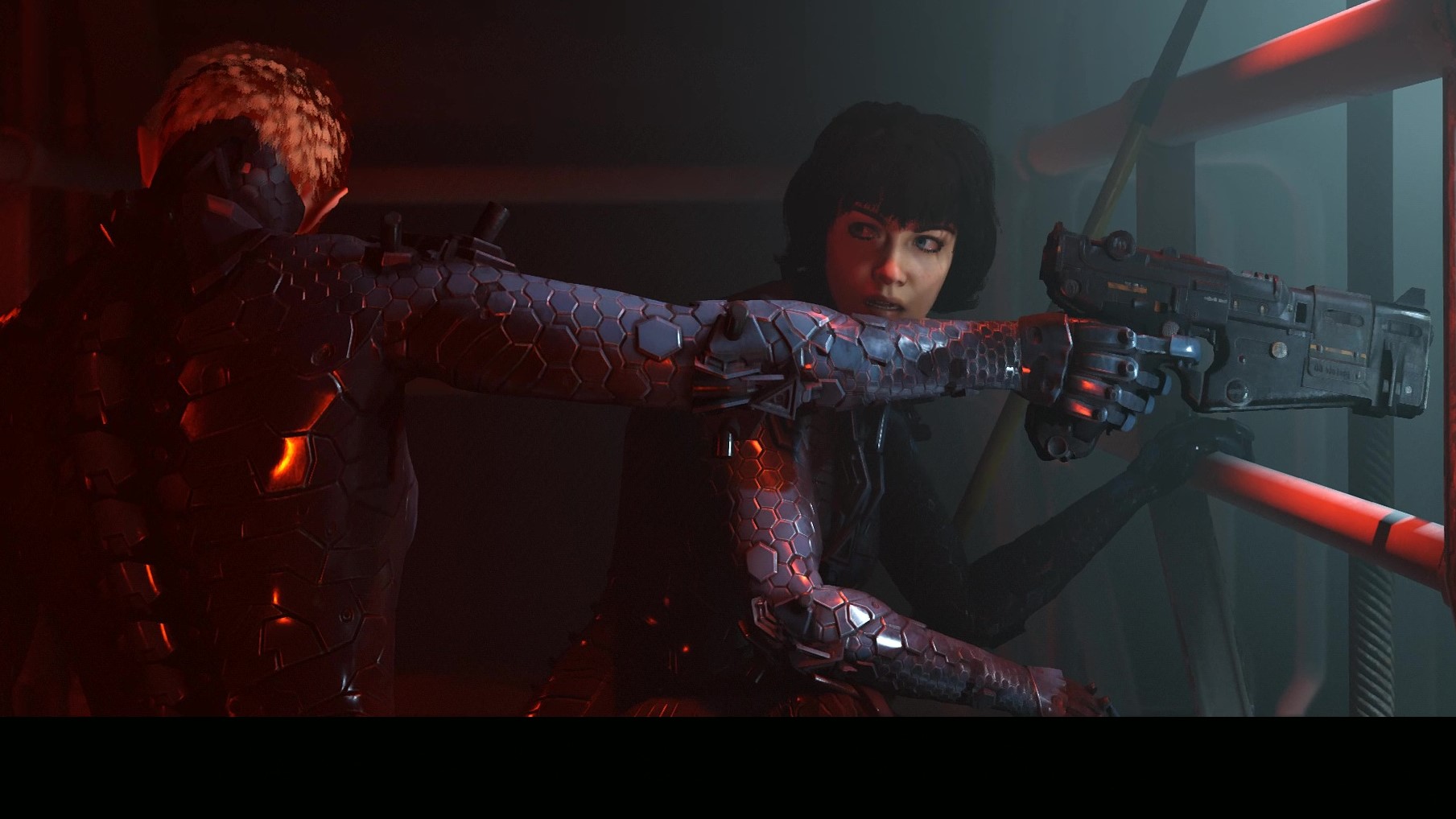Our Verdict
Youngblood's gorgeous, terrible world is worth exploring, despite a slight narrative and oppressively boring progression systems.
PC Gamer's got your back
Wolfenstein: Youngblood shifts the focus from the previous games' bubblegum catharsis of killing the most hateful people alive to killing them as efficiently as possible. The Nazis have health bars now, and a true pistol shot to the head or axe to the throat won't always cut it. You and a friend (or computer) need to level up to more effectively chip away the white portion of their health bars to get to the red portion, the blood and guts inside.
Over the course of my playthrough, sometimes with a friend and sometimes without, I noticed my eyes begin to drift away from the glorious violence and up towards the health bars. Youngblood is grisly and indulgent and an incredible setting to explore, but casually burdens the player with calculations of time and efficiency rather than gift them another cosmic victory lap. Taking out Nazis is as comic as ever, but the fun is tempered by a leveling system that slows down the action and overall pacing a little too often.
Teenage Riot
The best part of Youngblood is easily the level design.
Youngblood is a co-op venture with a completely different structure than the linear pathing of the last two games. This one's set in three districts of 1980s Nazi-controlled Paris, more open and free to explore than The New Order and New Colossus, but not a seamless singular open world. You and a friend (or AI) play as B.J. Blazkowicz's twin teenage daughters. When B.J. heads to Paris without a word, they're compelled to hijack a helicopter and look for pops, disrupting the local Nazi occupation all the while. You have to expect collateral damage from the family of the man that—spoiler—killed Adolf Hitler.
I miss the surprisingly heartfelt characters and incessant goofing off. It's here, too, but only at major narrative milestones and in short bursts of dialogue between the sisters, too often drowned out by gunfire and screams or overlapping radio comms. There's just enough narrative to keep things moving, though, and it sets the series up for a surreal, badass finale.
With the story so slight, the best part of Youngblood is easily the level design. Arkane Studios of Dishonored and Prey came on board to design '80s Nazi-controlled Paris, and it shows in every inch of the space. Open windows four stories up are invitations inside, with a new focus on height thanks to a double-jump ability available from the start.
Each district is completely open to exploration, assuming high-level Nazis don't make it impossible. Some highlights from my home invasions: a grimy apartment home to an amateur Nazi rock band, junk food and empty sodas piled up in the corners, a drum set and guitars on wooden pallets stuffed into the crowded living area; a banal Nazi office space lined with dreary, featureless cubicles, the ennui alive and well in every timeline; a video rental store advertising televisions and VHS players and campy horror movies with a distinct fascist twist.
I don't know that Nazis would have produced pop culture inches away from our own, but I appreciate the subtle way Youngblood says, 'Hey, it's the '80s'. This isn't a bath of neon and synthesizers, just a sprinkling of material objects and advertisements pointing to a new time in an old city.
There's so much pressing players to move on—leveling up, side missions that crop up while exploring, a potentially impatient lizard-brained co-op partner—but I wanted to linger in every space to soak up all the original art and nearly invisible details propping up the gorgeous, terrible alt-history nightmare. It's not as cohesive as Dishonored and assets repeat quite often, but exploring Youngblood's tiny cut of Paris is the reason to play. I want every Wolfenstein game to give me time to breathe and explore like this.
Each district is home to a massive Nazi stronghold called a Brother, and infiltrating each is part of the greater mission at hand. It's possible to waltz in the front door of all of them after the introductory mission, but exploration and finishing up side missions will yield safer routes inside and new tools to make the job easier. Unless you're a stealth god, walking in without upgrading any guns or abilities is going to be a challenge.
In one side mission, I find a battery that powers a laser mounted on a bus. I use this laser to melt a hole through a thick layer of reinforced steel blocking a city street bordering a Brother station. A sewer entrance on the other side leads to a labyrinth beneath the district, and some Doom 3-esque shooting ensues: suicide vest wearing dogs rush me in the total darkness while I struggle to pick them off with a pistol in one hand and a flashlight in the other. Should've saved up for the shotgun flashlight attachment.
Once through (poor pups), I ascend a massive tower, leaping around its edges on sketchy scaffolding. Paris stretches out into the smoggy horizon as an army of zeppelins flitter in and out of the grey sky like plump gods. It's an amazing view, and I'm glad I took the time to get there through the back door, though I wasn't necessarily quiet about it. No other game series does alt-history fiction like this: gorgeous, horrific, and so, so dumb.
Aufleveln
Like the previous games, stealth is only useful until players are spotted. It's more of a way to soften up the arena before getting loud and messy. Slipping up and unleashing a horde of soldiers is easy, soldiers in chunky exoskeletons, Panzerhunds, drones, and huge mechs. They keep coming until the wiry commander hanging out somewhere in the back dies. And because there are two good guys with guns, there are also way more enemies in Youngblood.
Wolfenstein's guns look and behave like guns that made love to a coal train.
Pep signals are abilities on a cooldown that let players buff one another to soften the onslaught, whether it's reviving them from a distance or overcharging their armor in the thick of it. It's a nice way to remind my partner that we're playing together, because little of Youngblood requires any cooperation.
Computers make good friends too. I spent about half the campaign with an AI companion, who never got in the way and required next to no babysitting. I'm pretty sure they can't break stealth status, either. Every now and then we'll need to turn two keys at the same time, but otherwise Youngblood works like a big dumb shooting gallery in an amazing setting with optional co-op. Little brainpower is required.
Per usual, Wolfenstein's guns look and behave like guns that made love to a coal train. They're oily, iron contraptions that clap when the trigger is pulled—except for the cute poot of the silenced pistol—and kick like hell (except they don't kick too hard: I'm wearing some ancient holy armor that gives me the strength of a dozen people).
I'm partial to the shotgun because duh, but also because I can't even tell what happens when it fires. There's a boom, then a Nazi flinches and usually falls into a few pieces. That is, unless they're a level 25 Nazi and I'm only level 22. When a classic videogame shotgun does not dissolve a man immediately, I begin to think something isn't right. Damn health bars.

But eight hours in and with thousands of credits saved up from completing side missions and opening crates hidden around the world, I finally finish upgrading the shotgun. It becomes what it was always meant to be. I can turn unarmored enemies into mist and chip away at the big guys much more effectively, though they're still stubbornly hardheaded. I don't change weapons often anymore, even if certain weapons are more effective at dissolving different types of armor. I've settled comfortably into my loud and boisterous playstyle. A little too late though, if you ask me.
For all its visual splendor and rad guns and alluring locales, Youngblood is compromised by a progression system that feels wholly designed to exploit attention and time, to deliver a tiny dopamine rush with every level up or skill upgrade or new weapon attachment, none of which changed how I play.
Youngblood touches the big trends set forth by popular games, like Destiny and The Division, doling out daily and weekly missions and inserting a progression track and damage system that's a little too looter-shooter for my taste. There's even an endgame: Missions set after finishing the game that require leveling up most skills and guns to effectively take on.
It's a nice bonus if you want to stretch out that time-played per dollar spent ratio, but I felt completely finished after watching the credits roll. I'm happy to hop in and knock out a few missions with a friend, but there's no joy in grinding out mission after mission just to level up and take on higher-level side missions, reconfigurations of the same stuff I've already accomplished.
Unlockable abilities are linear anyway: more health, more shields, more damage when charging someone. The only tax is on your time. The levels might be designed by Arkane Studios, but I wasn't capable of carving out creative solutions with skill points in Youngblood. I just made the guns and meatheads better at shooting and stabbing.
I can't think of a reason why the player and the enemies even have levels. Early on, it's used to keep players away from late game areas, but it doesn't take long to level up enough to get there. And once I did level up, enemies leveled up with me. Besides a tiny damage boost per level, the only palpable upgrades that make taking them out easier come from juicing weapons, health, and shield reserves. As far as I can tell, the level numbers are there just to make me feel like I'm progressing, or to stop me from moving through the story too quickly.
Leveling is a momentum killer. Once the final levels became available, I wanted to keep going because the story had just picked up. Those charming cutscenes and characters were back and I wanted to stay on the ride, but the next mission was rated two levels higher than my character level. I played it anyway because the foreboding skull icon signifying a massive level discrepancy wasn't there. I saw it as a green light. And while the smaller enemies went down with single clicks from my super shotgun, armored enemies required ducking in and out of cover and sprinting circles around the map in search of more ammo, armor, health, and grenades just to whittle down their armor, even though they were only one or two levels above mine.
The Wolf games are best when there's nothing between the player and the action.
The final couple fights carried on for far too long as I whittled away at seemingly infinite shield and health bars on the bigger enemies and bosses. I forgot I was making evil people explode and started looking at the clock. To make sure those final fights didn't drag, I would've had to play a side quest or two—a 30 minute or more intermission—right before the final act. That's bonkers pacing.
Why slow things down? Grinding out side missions and dailies isn't rewarding, they're barriers. The real treat is the arrangement of limbs and gristle and scarlet spilling into these incredibly detailed Parisian street gutters. The Wolf games are best when there's nothing between the player and the action, but when it takes ticking down a health bar couched in an XP and leveling system that overlays the whole affair, it distracts from the series' greatest strengths: the gunplay and grotesque, comical violence.
The drop-in and drop-out co-op is great and the gun and character upgrades are fairly in line with the previous games, but the leveling system places speed bumps on my cosmic reparations murder-parade route. Youngblood is a great time, even better with friends, but it drags whenever the level system demands attention. It only stings because it's so unnecessary.
Youngblood's gorgeous, terrible world is worth exploring, despite a slight narrative and oppressively boring progression systems.
James is stuck in an endless loop, playing the Dark Souls games on repeat until Elden Ring and Silksong set him free. He's a truffle pig for indie horror and weird FPS games too, seeking out games that actively hurt to play. Otherwise he's wandering Austin, identifying mushrooms and doodling grackles.



